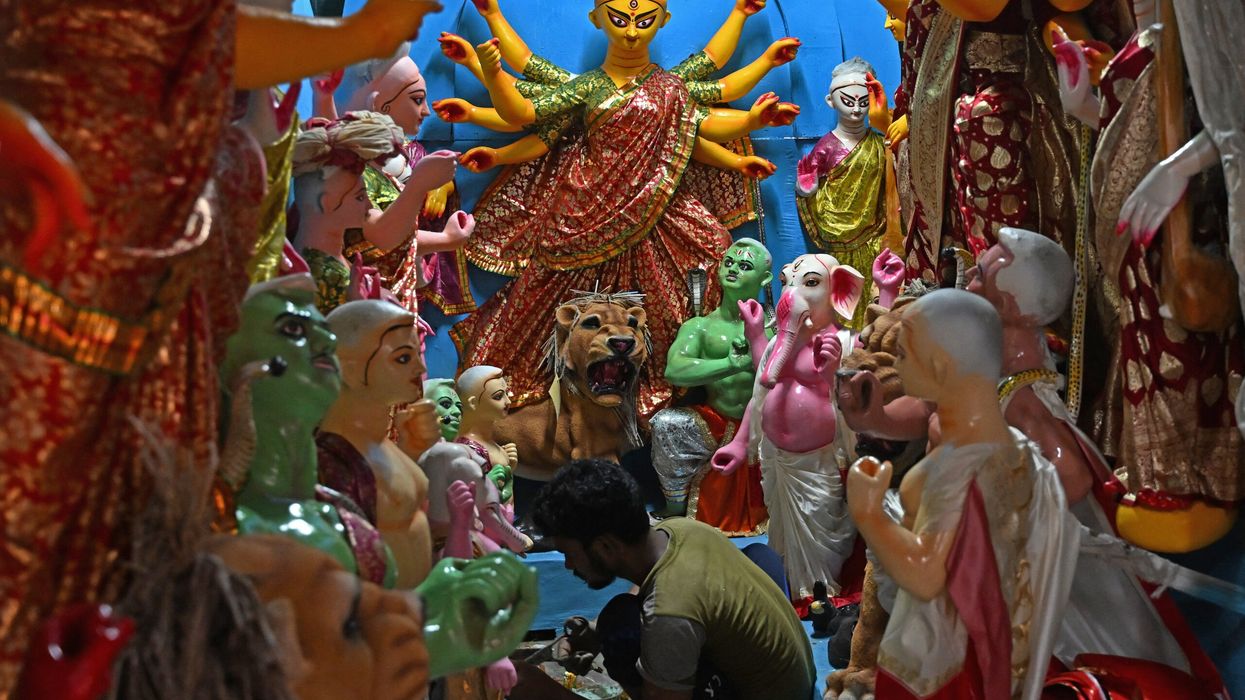EVERY year in India’s megacity Kolkata, the world’s oldest trade gets fleeting respect from an ancient custom – when soil outside brothels is considered sacred and collected for Hindu rituals.
Those working in the eastern port city’s ever-busy red light district say the coveted earth is a bitter reflection of society’s discriminatory attitudes – desired when needed, downtrodden filth when not.
The doorstep dirt is seen as holy by Hindu devotees, who believe it is imbued with special qualities because it is where men leave behind all that is good before entering for sex.
This scooped-up soil is included in clay to make brightly-coloured idols of the beloved goddess Durga, or used to give an earth “bath” of the statues made for the festival.
Sex worker Salima, a lady in her thirties working in Kolkata’s Sonagachi red light district, is angered at the dirt-gathering tradition. In the eyes of society, she is seen as having “no dignity”, said Salima, not her real name.
Gathering the soil is part of the celebrations for Durga Puja, the biggest festival in the eastern state of West Bengal, with celebrations this year beginning in October. “When you want the soil from my hand, you suddenly respect me,” she said.
“What kind of a rule is this?” A spokeswoman for sex worker association Durbar Mahila Samanwaya Committee said its members tried to stop artisans from taking the soil.
The week-long festival celebrates the victory of Durga – a powerful multiarmed goddess often depicted riding a lion, revered as a protective mother – over a demon.
“The men who enter the sex worker’s house leave all the good in them at her doorstep,” said Jayanta Kushary, 64, who is the founder of the Sarva Bharatiya Prachya Vidya Academy, which teaches Indian culture.
“That is why that soil from outside the sex worker’s house is considered holy.”
Kushary said the soil should be used to “wash” idols.
However, families in Kolkata also use the soil to make idols themselves, which are then venerated before being immersed into the holy River Ganges at the festival’s culmination.
Samar Dutt’s family has used the soil both for idols and holy baths for more than a century – and he for one decries how sex workers are often shunned and looked down on.
“They are not the dark side of society,” he said. “They are equal with other people.”
Dutt said modern construction with concrete and tarmac roads meant that sometimes finding a good place to collect the soil was hard.
So artists have found a solution.
“The sex worker goes to take a bath in the Ganges, and gets soil from there,” he said. “Then she keeps it outside her house, from where it is collected.”
Kushary insisted that it was important for the society to respect sex workers.
“They are very, very important to our society,” he said. “The sex worker is a social worker.”
The Hindu festival is a busy time in the red light zone.
Soliciting for sex is illegal, but workers say police often turn a blind eye in exchange for cash.
But the sex workers say none of the men collecting dirt have invited them to join a Durga Puja celebration.
“They don’t even recognise us,” said Pushpa, whose name has been changed to protect her identity, adding the men “look at us with disgust”.
“The women think we will snatch their husbands if we talk to them,” she said. “But we have no such thoughts.”
Salima said her family has little idea how she earns her living, work she turned to because she had no alternative. “We don’t like doing this work,” Salima said.
“When the men come, they ask us to do many things. They say they won’t use a condom, that they don’t like it. Helpless, we say ‘okay’, but we don’t feel right”.













